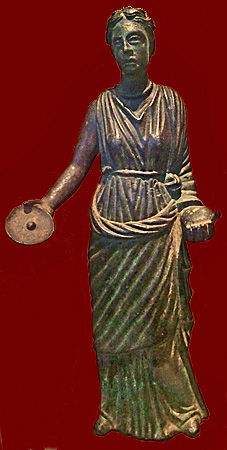
Statue of woman worshipping
Bronze, 2nd century BCE

Phidyle is the addressee of this lyric poem by Horace (65-8 BCE). It is uncertain whether she ever existed or is a product of the poet's imagination; all that is known of her must be gleaned from the poem itself. She is unusual in that she, evidently a woman of the lower classes and a peasant living in the countryside (rustica), is the focus of an elite literary form written by a man who became a leading poet of the Augustan period. Her name is Greek in origin, suggesting that she may have been an immigrant, a freedwoman or a slave (see Names: Roman women/slaves). It is unclear what her relationship is to the poet, whose tone is paternalistic as he (her dominus?) instructs her, as she remains silent, on the ritual practices proper to the propitiation of the gods of the household (di familiares). Perhaps she is a fiction,modelled on a simple countrywoman living on Horace's father's farm in Venusia (once Samnite territory), where he grew up. Equally she may be a composite of peasantwomen who were tenants on Horace's estate in the Sabine Hills, 30 miles from Rome, gifted to him in c. 37 BCE by his patron Maecenas, well before the publication of Odes I-III in 23 BCE. Since the duty of worshipping the Lares belonged to the materfamilias of the house, the domina, and since the poet had no wife, it is possible he may have charged a woman of his household, either married or in a slave union (contubernium), to conduct the sacra familiae (see Columella, De Re Rustica, Praefatio XII on the duties of the vilica). In the poem Phidyle is instructed in the first two stanzas that prayerful gestures, offerings of incense, newly harvested produce, and a fat pig sacrificed to the Lares familiares will keep the farm healthy and flourishing. She is counseled in Stanzas 3 and 4 that the rich offerings of public sacrifices are not her concern. Rather, in the concluding fourth stanza she -- and we, the poet's audience -- are assured that simplicity, honesty, and purity are what motivate the Di Penates to grant prosperity to the household. The meter of the poem is Alcaic Strophe (see scansion); click here for an overview of Horatian lyric meters.
Ancient sources: Columella, De Re Rustica XII on the duties of the vilica; Plautus, Aularlaria Prologue on the worship of the Lar familiaris; Ovid, Fasti 4.905-942 on the sacrifice for Robigo; see texts in World of Religion related to women's participation in domestic rituals. For further information on related topics, take a tour of Horace's villa, see: video on Roman Household Spirits; Chiu, Richlin (2014), Scheidel (1996) in the Bibliography.
Caelo supinas si tuleris manus
nascente luna, rustica Phidyle,
nec pestilentem sentiet Africum
fecunda vitis nec sterilem seges
Nam quae nivali pascitur Algido
devota quercus inter et ilices
cervice tinguet; te nihil attinet
temptare multa caede bidentium
parvos coronantem marino
Immunis aram si tetigit manus,
non sumptuosa blandior hostia,
Click on the underlined words for translation aids and commentary, which will appear in a small window. Click on the icon link
![]() to the right of the
poem for related images and information.
to the right of the
poem for related images and information.